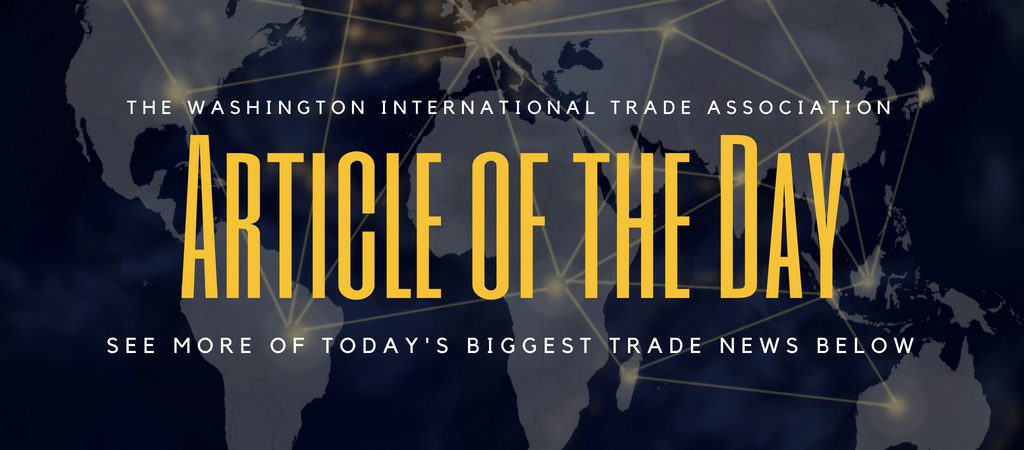A new round of tariffs on European Union goods, such as wine, cheese and olive oil, are set to go into effect Friday, a move that illustrates the current dim prospects for a broader U.S.-EU trade deal. Negotiations for the deal stalled earlier in the year over agriculture issues, and lawmakers and trade groups see no indication that the sides are any closer to starting negotiations.
© Provided by MediaDC: Washington Newspaper Publishing Company, Inc.
“There’s been some low-level discussions between our country and the European Union but I don’t think much progress has been made,” Senate Finance Committee Chairman Chuck Grassley told the Washington Examiner.
Friday’s tariffs are the result of a World Trade Organization ruling earlier this month that went the Trump administration’s way. But the U.S. tariffs are also intended to send a message to the EU that it should reconsider its position on agriculture in any broader trade talks, some involved in the trade dispute believe. The EU does not want to discuss its agriculture policies in future talks, so the U.S. is using the WTO ruling to try to force a discussion on them now. “The same reason that Europe is reluctant to include ag and food products in bilateral negotiations (for a broader deal) is the exact motivation the U.S. has to target them in this WTO case,” said a top Washington lobbyist for the agricultural industry.
U.S.-EU trade talks were seriously pursued by both sides earlier in the year but ran aground largely over the issue of agricultural subsidies. The U.S. wanted them included but EU officials steadfastly refused.
Instead, the Trump administration is set to enact new 10%-25% tariffs on about $7.5 billion worth of European Union products such as airplane parts, cheese, meats, olive oil, fruit juice, jelly, seafood, wine, and textiles. The move follows a ruling by the WTO earlier this month that the EU had been subsidizing Airbus, prompting the U.S. to advance retaliatory tariffs.
“Basically, they’re targeting the countries that contribute the most to the AirBus subsidies: Italy, the U.K., Germany, Spain and France,” said an agricultural trade association official who requested anonymity. “The tariffs are mostly on airplane parts, but they put the ag stuff in there so the EU will take it seriously.”
Agriculture is often targeted in trade disputes because it is politically sensitive, but the timing of the WTO case suggests the Trump administration is using it as a way to send a message to the EU on the broader talks, the industry lobbyist noted.
“This particular WTO Airbus arbitration process really got going in April,” the lobbyist said. “Well, the EU parliament had passed a resolution in early March that was the negotiating mandate for bilateral talks with the U.S. The EU made a big public point of not including agriculture in that mandate. Then, lo and behold, in April the Trump administration publishes a list of proposed products to retaliate against in the WTO case, and what do you see but a lot of food and ag products?”
Italian President Sergio Mattarella met with President Trump Wednesday in Washington, D.C., in the hopes of dissuading him from the retaliatory tariffs. Trump expressed sympathy but was noncommittal.
“We have a very good relationship [with Italy] — sometimes stymied by the European Union, which is, frankly, very tough to deal with and very tough negotiators, very unfair negotiators. They know I feel that way. And we’ll see what happens, ultimately, with the European Union,” Trump said.
Grassley said the administration had expressed interest in a limited deal with the EU but indicated that there was little appetite for it in Congress. Farm state senators on both sides of the aisle have eager for EU agricultural subsides to be addressed.
“I think there is some interest on the part of the U.S. to sit down with Europe tin regarding to manufacturing and services and not do much on agriculture,” the Iowa Republican said. “But I’m not much of an advocate for that position. I think the U.S. ought to stick to a comprehensive agreement.”
“If there’s going to be talks, ag has got to be in there and Congress is right there with us,” the industry association official said.
A coalition of U.S. trade associations that import the EU products such as the National Restaurant Association and the Natural Retail Federation wrote U.S. Trade Representative Robert Lighthizer Wednesday asking that exports order prior to Oct. 2 but not yet shipped be exempted from the tariffs. “Nearly every product impacted by these tariffs transits to the United States from Europe by sea,” they said.

